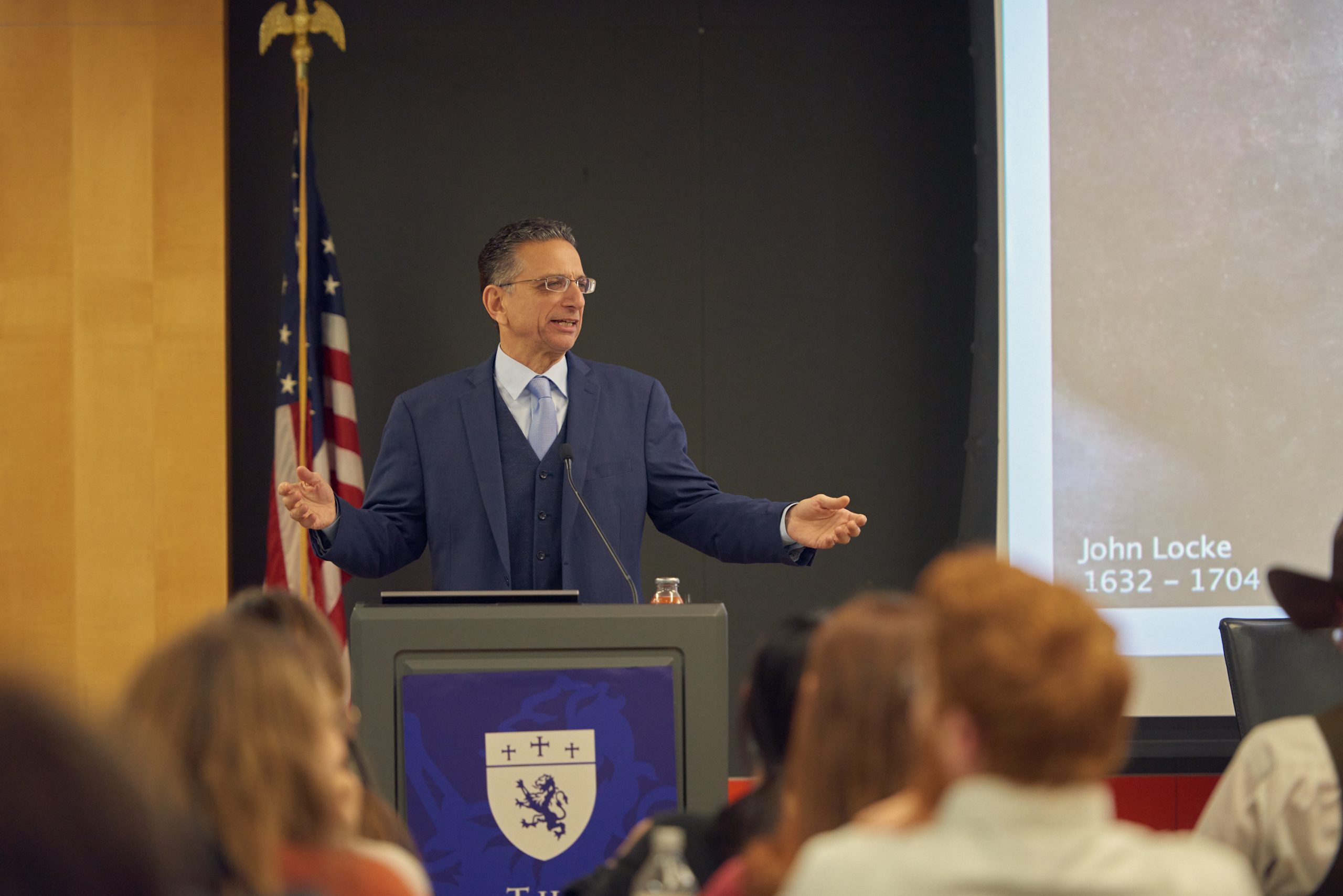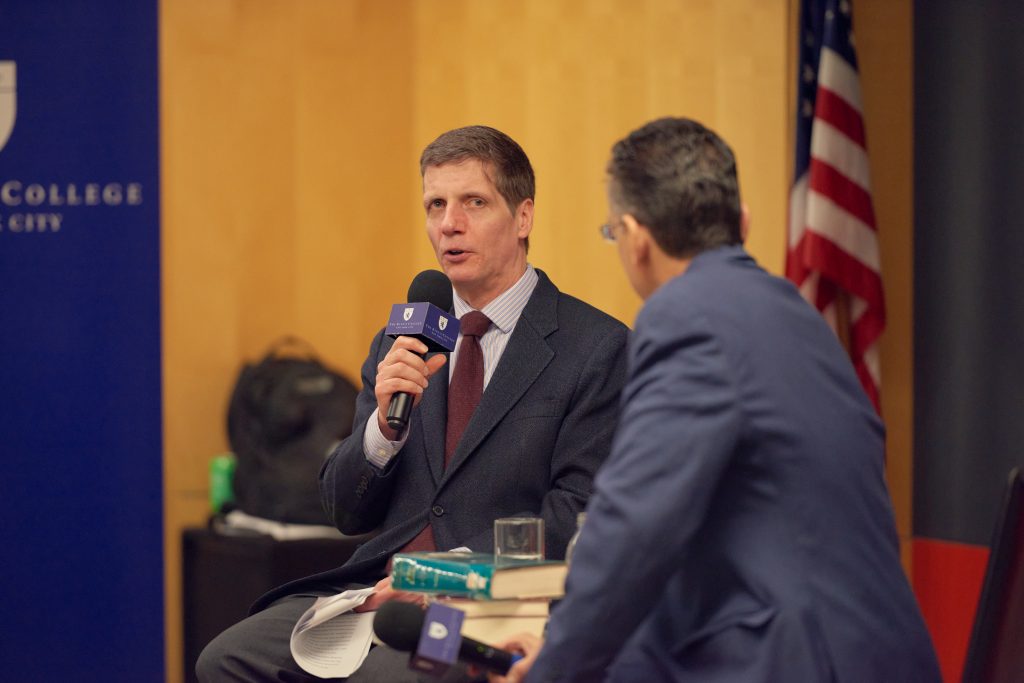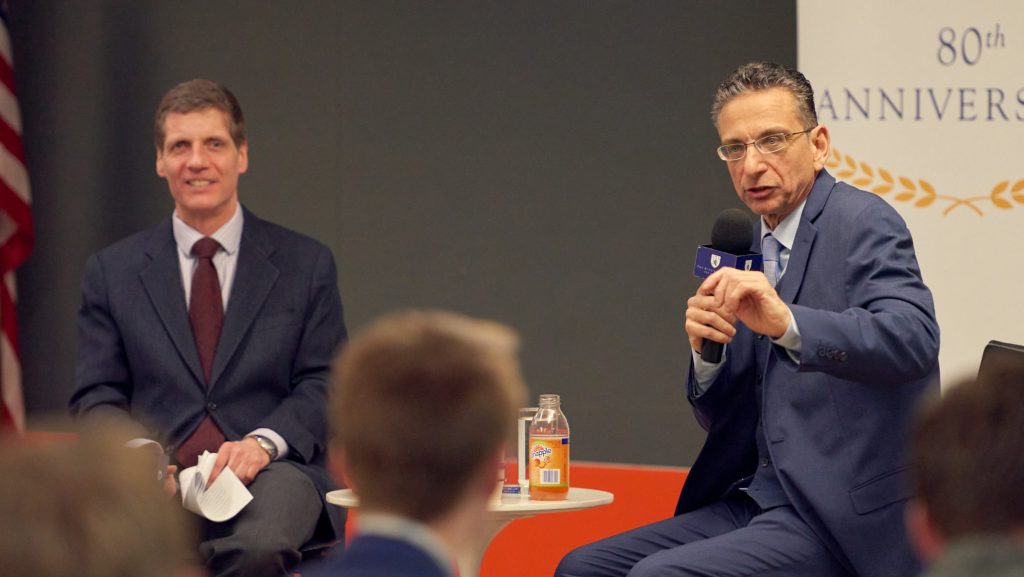President’s Lecture Series: Dr. Joseph Loconte and Dr. David Tubbs On Locke’s Liberal Democracy
Was Locke’s Christian faith sincere, and is his project of liberal democracy morally legitimate? Loconte argues yes; Tubbs raises concerns.

On February 5, Dr. Joseph Loconte, associate professor in history and senior fellow in Christianity and culture at The King’s College, gave a lecture entitled “John Locke and His Critics: A Christian Case for Liberal Democracy.” Following the lecture, Dr. David Tubbs, associate professor of politics, offered a short response.
Loconte’s lecture is the most recent installment in the President’s Lecture Series. President Tim Gibson introduced Dr. Loconte and Dr. Tubbs noting that “Today we get to look at the roots of liberal democracy through the lens of our highly qualified and distinguished professors.”
In the lecture, Loconte introduced Locke’s greatest critics and the case they bring against the sincerity of Locke’s Christian devotion. Perhaps the most important of these critics is Leo Strauss, a twentieth century political philosopher who, according to Loconte, “persuades a generation of political theorists that Locke was really a closeted Hobbesian—skilled in using biblical language to cloak an individualist, anti-religious agenda. To Strauss and his followers, Locke was an enemy of traditional religion.” Loconte continued in his description of Strauss’s opinion of Locke, “Strauss’s damning conclusion? Locke is a hedonist. And I want to say with a sinister inflection, a hedonist.”
Strauss and his followers are not the only ones who take issue with Locke’s liberal democracy. Loconte spoke about the “small, but important group of religious conservatives who have rejected the liberal democratic project as morally illegitimate.” Included in this group is Patrick Deneen, Catholic political scientist and author of Why Liberalism Failed. Deneen “portrays Locke as an almost demonic opponent of Christianity and God’s moral law,” according to Loconte.
Professor Loconte’s appreciation for what he perceives to be Locke’s genuine faith emanates from the work of John Dunn, a political scientist who, in 1969, arrived at a nearly opposite conclusion as Strauss and Deneen. Dunn wrote, “Locke’s overall conceptual approach to human society, and the political ideas which flow from it, is saturated with Christian assumptions.”
Loconte agreed, “I think the portrait of Locke as a postmodern hedonist has not held up well under scholarly scrutiny. The conservative assault on Locke arrives at a peculiar historical moment. We now have decades of Locke scholarship exploring his lifelong religious concerns.” Loconte proceeded to explore this scholarship for the remainder of his lecture.
Loconte started by mentioning Locke’s voluminous writings, including his published and unpublished manuscripts, his notebooks, commonplace books, and thousands of personal letters, which include countless references to God and the faith Locke claimed to profess. Loconte argued that the historian encounters in Locke a devoted student of the Bible who considered himself an orthodox Christian. This historian will find that “Locke’s defense of individual rights and freedoms was rooted in a profound reverence for the Hebrew and Christian scriptures.”
The final sentence of Locke’s “Notes on The Epistles of St. Paul” declares Locke’s belief that Jesus Christ is, and ought to be, his only “Lord and Master.” Loconte points to this as evidence that Locke was a genuine believer and follower of Christ. In A Letter Concerning Toleration, Locke writes that Jesus is the “Captain of our salvation.” Loconte emphasizes Locke’s use of the word “our” in this sentence. Locke included himself among those who believed Jesus the captain of their salvation. Point #7 of the Letter offers the most convincing passage, which Loconte describes as “The punchline of the whole letter.” It reads, “The sum of all we drive at is that every man enjoy the same rights that are granted to others.” Loconte asked, “Friends, is this not a political application of the golden rule?”

Following Loconte’s lecture, Dr. Tubbs offered a short response, addressing a few points on which he wanted Loconte to elaborate. He started by noting that “Dr. Loconte has done us a real service by giving us a historically-informed lecture.” He then offered a playful jest, saying, “You might wonder why Loconte, with his Italian roots, has given us a lecture on Locke instead of Machiavelli?”
Tubbs said that as Loconte’s interlocutor, “What we need to do is ask whether Loconte has interpreted Locke correctly and whether Locke, as Loconte argues, provides a theoretically strong account of liberal democracy.” This begins, according to Tubbs, with addressing both the critics and defenders of Locke, both those “who believe Locke was sincere in his Christian profession [like Dunn] and those who believe he was insincere [like Strauss].”
According to Tubbs, Strauss believed that Locke may have masked his true personal beliefs about Christianity to avoid persecution by state officials. Tubbs paraphrased Strauss’s position, “In these circumstances, the great philosophers learned to write in a special way… a deeper, more careful reading of the text occasionally revealed hidden meanings or messages that challenged different orthodoxies of the day.”
Tubbs, although not necessarily convinced by Strauss’s reasoning, believes Loconte must respond to these claims. He said, “We ought to ask Professor Loconte whether he has considered the possibility that some of Locke’s most important works may need to be reassessed or reappraised. As Loconte himself reminds us, Locke lived through wars of religion and persecution for religious belief was common. Accordingly, Locke might have had good reason to keep some of his views concealed from everyone except a small number of persons who could read between the lines of his philosophic text and discern its true meaning.” Tubbs asserted that Strauss’s claims have recently received support from the scholarship of Arthur Melzer, who, in his book, Philosophy Between the Lines: The Lost History of Esoteric Writing, has documented the history of esoteric writing in Europe.
The second question Tubbs proposed to Loconte concerns the adequacy of Locke’s defense of liberal democracy. Tubbs worries Locke did not anticipate all of the modern complexities of the question of religious toleration. Tubbs voiced this,
Suppose that Loconte is correct in arguing that Locke’s defense of religious freedom rests in a genuine Christian conviction. We still need to think about the adequacy of Locke’s defense… Locke’s defense seems to miss or ignore what has become the central question in contemporary debates about religious freedom. Namely, does religiously motivated conduct that violates general laws deserve to be exempted from the operation of those laws?
Tubbs concluded his response by saying, “Now, I don’t want to criticize Locke too severely for failing to anticipate all the dimensions of the contemporary problem. At the same time, I am not sure that the intellectual resources that Locke has bequeathed us are sufficient to solve this problem.” The event concluded with a brief discussion between Loconte and Tubbs on the questions Tubbs raised.





